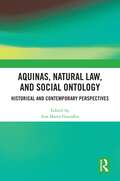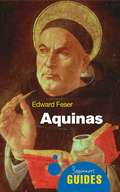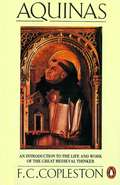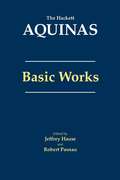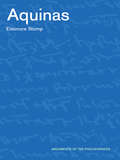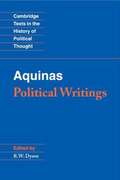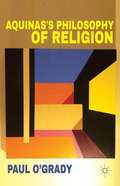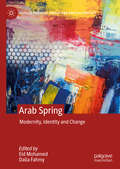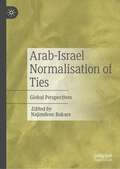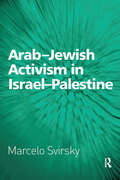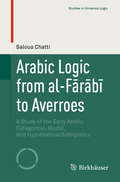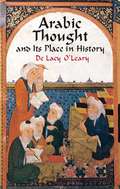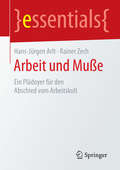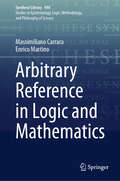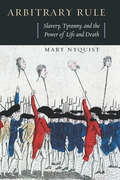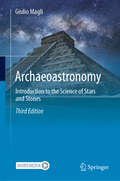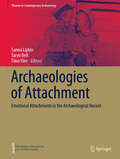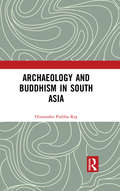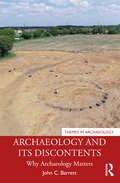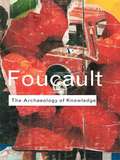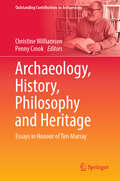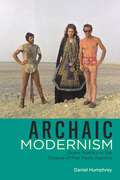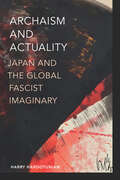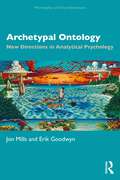- Table View
- List View
Aquinas, Natural Law, and Social Ontology: Historical and Contemporary Perspectives
by Ana Marta GonzálezThis volume explores the connections between Thomas Aquinas’ doctrine of natural law and contemporary social thought. It aims to make explicit the basic notions of Thomas Aquinas’ social ontology and to show how key concepts from sociology, economics, and political science relate to his ethics and social thought.Social ontology is a growing area of contemporary social theory. Scholars in this area reflect on the ontological status of society and the various realities that make up the social realm. However, Aquinas scholars rarely use the term social ontology, instead resorting to his natural law to examine social life. This volume argues that the social thought of Thomas Aquinas, including his natural law theory, implies a social ontology. Aquinas adopts a clear position on the ontological uniqueness of human beings, the intentional structure of human action, and the existence of informal social relations and institutional realities that shape human society. This volume shows how these views can be reconstructed into a coherent social ontology. Its chapters are divided into five thematic parts. Part 1 offers conceptual elements to bridge the gap between Aquinas and contemporary social theory. Part 2 considers the metaphysics and theology implicit in Aquinas’ social ontology. Part 3 focuses on the way this ontology is at work in his account of the common good and his approach to natural law. Part 4 expands this reflection to economics. Finally, Part 5 addresses legal and political issues such as political polarization, family law, and the ethics of war.Aquinas, Natural Law, and Social Ontology will appeal to scholars and graduate students interested in the thought of Thomas Aquinas, social and political philosophy, contemporary social theory, Catholic theology, and the social sciences.
Aquinas: A Beginner's Guide (Beginner's Guides)
by Edward FeserOne of the most influential philosophers and theologians in history, St. Thomas Aquinas was the father of modern philosophy of religion, and is infamous for his "proofs" for God's existence. In this cogent introduction to the great Saint's work, Edward Feser argues that you cannot fully understand Aquinas' philosophy without his theology and vice versa. Covering his thoughts on the soul, natural law, metaphysics, and the interaction of faith and reason, this will prove indispensable for students, experts or the general reader.
Aquinas: An Introduction to the Life and Work of the Great Medieval Thinker
by F. CoplestonAquinas (1224-74) lived at a time when the Christian West was opening up to a wealth of Greek and Islamic philosophical speculation. An embodiment of the thirteenth-century ideal of a unified interpretation of reality (in which philosophy and theology work together in harmony), Aquinas was remarkable for the way in which he used and developed this legacy of ancient thought—an achievement which led his contemporaries to regard him as an advanced thinker. Father Copleston's lucid and stimulating book examines this extraordinary man—whose influence is perhaps greater today than in his own lifetime—and his thought, relating his ideas wherever possible to problems as they are discussed today.
Aquinas: Basic Works (The Hackett Aquinas)
by Thomas Aquinas Robert Pasnau Jeffrey HauseDrawn from a wide range of writings and featuring state-of-the-art translations, Basic Works offers convenient access to Thomas Aquinas' most important discussions of nature, being and essence, divine and human nature, and ethics and human action.The translations all capture Aquinas's sharp, transparent style and display terminological consistency. Many were originally published in the acclaimed translation-cum-commentary series The Hackett Aquinas, edited by Robert Pasnau and Jeffrey Hause. Others appear here for the first time: Eleonore Stump and Stephen Chanderbahn's translation of On the Principles of Nature, Peter King's translation of On Being and Essence, and Thomas Williams' translations of the treatises On Happiness and On Human Acts from the Summa theologiae.Basic Works will enable students to immerse themselves in Aquinas's thought by offering his fundamental works without internal abridgements. It will also appeal to anyone in search of an up-to-date, one-volume collection containing Aquinas' essential philosophical contributions--from the Five Ways to the immortality of the soul, and from the nature of happiness to virtue theory, and on to natural law.
Aquinas: Essays In Honor Of Norman Kretzmann (Arguments of the Philosophers)
by Eleonore StumpFew philosophers or theologians exerted as much influence on the shape of medieval thought as Thomas Aquinas. He ranks amongst the most famous of the Western philosophers and was responsible for almost single-handedly bringing the philosophy of Aristotle into harmony with Christianity. He was also one of the first philosophers to argue that philosophy and theology could support each other. The shape of metaphysics, theology, and Aristotelian thought today still bears the imprint of Aquinas' work.In this extensive and deeply researched study, Eleonore Stump examines Aquinas' major works, Summa Theologiae and Summa Contra Gentiles, and clearly assesses the vast range of Aquinas' thought. Philosophers, theologians, and students of the medieval period alike will find this unrivalled study an indispensable resource in researching and teaching Aquinas.
Aquinas: Political Writings
by Thomas Aquinas R. W. DysonThomas Aquinas (1225-1274) is an extremely influential figure in the history of Western thought and the Catholic church. In this major addition to the Cambridge Texts in the History of Political Thought series, Robert Dyson has translated texts by Aquinas that reflect the complete range of his thinking, and clearly show his development of a Christian version of the philosophy of Aristotle. His translations are supported by brief biographies, notes for further reading and a concise critical introduction.
Aquinas’s Philosophy of Religion
by Paul O’GradyThis is an exploration and analysis of Aquinas's contribution to the philosophy of religion. It examines Aquinas's contexts, his views on philosophy and theology, as well as faith and reason. His arguments for God's existence, responses to objections against God's existence and his characterization of the nature of God are examined.
Arab Spring: Modernity, Identity and Change (Critical Political Theory and Radical Practice)
by Eid Mohamed Dalia FahmyThis book provides systematic, integrated analyses of emergent social and cultural dynamics in the wake of the so-called Arab Spring, and looks closely at the narratives and experiences of a people as they confront crisis during a critical moment of transition. Providing an interdisciplinary approach to interconnections across regional and communal boundaries, this volume situates itself at the intersection of political science, cultural studies, media and film studies, and Middle Eastern studies, while offering some key critical revisions to dominant approaches in social and political theory. Through the unique contributions of each of its authors, this book will offer a much-needed addition to the study of Middle East politics and the Arab Spring. Moreover, although its specific focus is on the Arab context, its analysis will be of issues of significant relevance to a changing world order.
Arab-Israel Normalisation of Ties: Global Perspectives
by Najimdeen BakareThis book focuses on rapprochement and normalisation between Israel and some Arab countries within the context of global and regional geopolitics, bringing together broader perspectives on transformations resulting from this. The analysis is rooted in a historical and cultural construction of the region as an Islamic sphere viewing Israel as a perpetuation of the Western colonial project in the region. It analyses how this normalisation must not be treated as a novel phenomenon, but as a reconstruction of the past and continuity in tradition geared at regional stability, signifying a wider shift in the structure of the global international system. The first section addresses the international perspectives of the changing dynamics through the lens of US domestic politics, disengagement plans, China’s increasing understanding of the geopolitics of the Abrahamic world. It equally pays enough attention to the attendant implications of this normalisation. The second section of the book explores the reflections of regional (state and non-state) actors, such as Turkey, Iran, Syria, Pakistan, and Hezbollah, and the catalysing effects of this normalisation within and beyond the region. The book is a rich resource for scholars of regional and international relations, in particular Middle East studies. It provides useful reading material for both undergraduate and graduate students of Political Science, think tanks, diplomats, and IR experts and policy analysts, who are desirous of having rich theoretical and empirical underpinnings of unfolding realities in the larger Middle East.
Arab-Jewish Activism in Israel-Palestine
by Marcelo SvirskyApplying the insights of Deleuze and Guattari's works to Israel-Palestine, Arab-Jewish Activism in Israel-Palestine sets out to re-conceptualise the relationship between resistance and power in ethnically segregated spaces in general, and the Israeli-Palestine context in particular. Combining many years of ethnographic study and political and social activism with a solid, theoretical, conceptual framework, Marcelo Svirsky convincingly argues that successful efforts to decolonise the region depend on taking the struggle beyond self-determination and making it collaborative. Decolonisation depends on political and cultural changes that elaborate on the historical partition of social life in the region that have been an issue since the early twentieth century. This elaboration means producing a civil struggle aimed at the destabilisation of the Zionist supremacy and resulting in a democratic, political community from the Mediterranean Sea to the Jordan River. Simply not just another book on Israel and Palestine, Arab-Jewish Activism in Israel-Palestine provides refreshingly new empirical evidence and theoretical analysis on the connection between resistance, intercultural alliances, civil society, and the potential for actualising shared sociabilities in a conflict-ridden society. An indispensable read to all scholars wishing to gain original insights into the transversal connections which transcend ethnicity.
Arabic Logic from al-Fārābī to Averroes: A Study of the Early Arabic Categorical, Modal, and Hypothetical Syllogistics (Studies in Universal Logic)
by Saloua ChattiThis monograph explores the logical systems of early logicians in the Arabic tradition from a theoretical perspective, providing a complete panorama of early Arabic logic and centering it within an expansive historical context. By thoroughly examining the writings of the first Arabic logicians, al-Fārābī, Avicenna and Averroes, the author analyzes their respective theories, discusses their relationship to the syllogistics of Aristotle and his followers, and measures their influence on later logical systems. Beginning with an introduction to the writings of the most prominent Arabic logicians, the author scrutinizes these works to determine their categorical logic, as well as their modal and hypothetical logics. Where most other studies written on this subject focus on the Arabic logicians’ epistemology, metaphysics, and theology, this volume takes a unique approach by focusing on the actual technical aspects and features of their logics. The author then moves on to examine the original texts as closely as possible and employs the symbolism of modern propositional, predicate, and modal logics, rendering the arguments of each logician clearly and precisely while clarifying the theories themselves in order to determine the differences between the Arabic logicians’ systems and those of Aristotle. By providing a detailed examination of theories that are still not very well-known in Western countries, the author is able to assess the improvements that can be found in the Arabic writings, and to situate Arabic logic within the breadth of the history of logic. This unique study will appeal mainly to historians of logic, logicians, and philosophers who seek a better understanding of the Arabic tradition. It also will be of interest to modern logicians who wish to delve into the historical aspects and progression of their discipline. Furthermore, this book will serve as a valuable resource for graduate students who wish to complement their general knowledge of Arabic culture, logic, and sciences.
Arabic Philosophy
by Peter Adamson Richard C. TaylorRepresenting one of the great traditions of Western philosophy, philosophy written in Arabic and in the Islamic world was inspired by Greek philosophical works and the indigenous ideas of Islamic theology. This collection of essays, by some of the leading scholars in Arabic philosophy, provides an introduction to the field by way of chapters devoted to individual thinkers (such as al-Farabi, Avicenna and Averroes) or groups, especially during the 'classical' period from the ninth to the twelfth centuries.
Arabic Thought and Its Place in History
by De Lacy O'LearyWell-documented study of the mutual influence of Arabic and Western worlds during the Middle Ages traces the transmission of Greek philosophy and science to the Islamic cultures. A fascinating portrait of medieval Muslim thought, it illustrates commonalities with Judaic and Christian teachings as well as points of divergence.
Arbeit und Muße: Ein Plädoyer für den Abschied vom Arbeitskult (essentials)
by Hans-Jürgen Arlt Rainer ZechDie Autoren erläutern, wie moderne Gesellschaften die Arbeitstätigkeit einerseits zum Lebensmittelpunkt der Menschen und andererseits zum Kostenfaktor der Wirtschaft machen, und thematisieren die soziale Frage, die aus dieser Spannung erwächst. Eine kurze Begriffsarchäologie von Arbeit und Muße lässt deutlich werden, wie eigenartig und einzigartig dieses Weltbild ist, aus dem Leistungsexplosionen und Zerstörungen in vorher unvorstellbaren Ausmaßen entspringen. Hans-Jürgen Arlt und Rainer Zech stellen Alternativen vor: Arbeit in die Schranken des Not-Wendigen verweisen, Tätigkeiten in bunter Vielfalt am selbstbestimmten Bedarf orientieren, der Muße als Ausdruck idealer Humanität Geltung und die Lebensführung verschaffen.
Arbitrary Reference in Logic and Mathematics (Synthese Library #490)
by Enrico Martino Massimiliano CarraraThis book develops a new approach to plural arbitrary reference and examines mereology, including considering four theses on the alleged innocence of mereology. The authors have advanced the notion of plural arbitrary reference in terms of idealized plural acts of choice, performed by a suitable team of agents. In the first part of the book, readers will discover a revision of Boolosʼ interpretation of second order logic in terms of plural quantification and a sketched structuralist reconstruction of second-order arithmetic based on the axiom of infinite, a la Dedekind, as the unique non-logical axiom. The work goes on to analyse the pros and cons of the new interpretation, also with respect to Linneboʼs objections to the thesis that second order logic is genuine logic. A theory of concepts that can be labelled as a theory of logical concepts is expounded. In the second part of the book, the authors consider grounding megethology on plural arbitrary reference and argue that the arguments for the ontological innocence of mereology are not conclusive and that – for a certain use of mereology – a thesis of innocence, similar to that of plural arbitrary reference, is defensible. The work proposes a virtual theory of mereology in which the role of individuals is played by plural choices of atoms. This considered work will appeal to scholars from branches of analytic philosophy, logic and the philosophy of mathematics in particular.
Arbitrary Rule: Slavery, Tyranny, and the Power of Life and Death
by Mary NyquistSlavery appears as a figurative construct during the English revolution of the mid-seventeenth century, and again in the American and French revolutions, when radicals represent their treatment as a form of political slavery. What, if anything, does figurative, political slavery have to do with transatlantic slavery? In Arbitrary Rule, Mary Nyquist explores connections between political and chattel slavery by excavating the tradition of Western political thought that justifies actively opposing tyranny. She argues that as powerful rhetorical and conceptual constructs, Greco-Roman political liberty and slavery reemerge at the time of early modern Eurocolonial expansion; they help to create racialized "free" national identities and their "unfree" counterparts in non-European nations represented as inhabiting an earlier, privative age. Arbitrary Rule is the first book to tackle political slavery's discursive complexity, engaging Eurocolonialism, political philosophy, and literary studies, areas of study too often kept apart. Nyquist proceeds through analyses not only of texts that are canonical in political thought--by Aristotle, Cicero, Hobbes, and Locke--but also of literary works by Euripides, Buchanan, Vondel, Montaigne, and Milton, together with a variety of colonialist and political writings, with special emphasis on tracts written during the English revolution. She illustrates how "antityranny discourse," which originated in democratic Athens, was adopted by republican Rome, and revived in early modern Western Europe, provided members of a "free" community with a means of protesting a threatened reduction of privileges or of consolidating a collective, political identity. Its semantic complexity, however, also enabled it to legitimize racialized enslavement and imperial expansion. Throughout, Nyquist demonstrates how principles relating to political slavery and tyranny are bound up with a Roman jurisprudential doctrine that sanctions the power of life and death held by the slaveholder over slaves and, by extension, the state, its representatives, or its laws over its citizenry.
Archaeoastronomy: Introduction to the Science of Stars and Stones
by Giulio MagliThis book provides the first comprehensive, easy-to-read, and up-to-date account of the fascinating discipline of archaeoastronomy, in which the relationship between ancient constructions and the sky is studied to gain a better understanding of the ideas of the architects of the past and their religious and symbolic worlds. The book is divided into three sections. The first section discusses in detail the fundamentals of archaeoastronomy, including the celestial coordinates, the apparent motion of the sun, moon, stars, and planets, observation of celestial bodies at the horizon, the use of astronomical software in archaeoastronomy, and current methods for making and analyzing measurements . The second part explores the past relations between astronomy and people, power, the afterworld, architecture, and landscape The final section reviews what archaeoastronomy can now tell us about the nature and purpose of such sites and structures as Stonehenge, the Pyramids of Giza, Chichen Itza, the Angkor Temples, the Campus Martius, Machu Picchu and the Valley of the Temples of Agrigento. Additionally, it provides a set of exercises that can be performed using non-commercial free software, e.g., Google Earth and Stellarium, and that will equip readers to conduct their research. This book is an ideal introduction to what has become a wide-ranging multidisciplinary science. This newly revised edition includes the most recent research on Stonehenge, ancient Japan, and other sites worldwide.
Archaeologies of Attachment: Emotional Attachments in the Archaeological Record (Themes in Contemporary Archaeology)
by Taryn Bell Sanna Lipkin Tiina VäreThis edited volume offers a new approach to the study of emotion in the past, focusing on the experience of emotional attachment. Psychological research has demonstrated that all humans are capable of forming a variety of close social and emotional attachments from cradle to grave, yet archaeology has not, to date, considered the significance of these attachments in any detail. Inspired by Bowlby’s theory of attachment, one of the key theories in developmental psychology over the last 60 years, this volume sheds light on what attachment is, how it functions, and how it has influenced human life and material culture from the Palaeolithic to the present. This volume brings together contributions from authors focusing on a variety of subjects related to attachment, from social relationships with people and animals, to places, to material culture, from the deepest reaches of prehistory to the contemporary era. It aims to improve our understanding of where and how archaeologists can look for evidence of these attachments, and in doing so, it helps us to consider how these shape our understanding of human behaviour, cognition and life more broadly. This volume is of interest to archaeologists and scholars of social attachment theory.
Archaeology and Buddhism in South Asia: An Archaeology Of Museum Collections (Archaeology And Religion In South Asia Ser.)
by Himanshu Prabha RayThis book traces the archaeological trajectory of the expansion of Buddhism and its regional variations in South Asia. Focusing on the multireligious context of the subcontinent in the first millennium BCE, the volume breaks from conventional studies that pose Buddhism as a counter to the Vedic tradition to understanding the religion more integrally in terms of dhamma (teachings of the Buddha), dāna (practice of cultivating generosity) and the engagement with the written word. The work underlines that relic and image worship were important features in the spread of Buddhism in the region and were instrumental in bringing the monastics and the laity together. Further, the author examines the significance of the histories of monastic complexes (viharas, stupas, caityas) and also religious travel and pilgrimage that provided connections across the subcontinent and the seas. An interdisciplinary study, this book will be of great interest to students and scholars in South Asian studies, religion, especially Buddhist studies, history and archaeology.
Archaeology and its Discontents: Why Archaeology Matters (Themes in Archaeology Series)
by John C. BarrettArchaeology and its Discontents examines the state of archaeology today and its development throughout the twentieth century, making a powerful case for new approaches. Surveying the themes of twentieth-century archaeological theory, Barrett looks at their successes, limitations, and failures. Seeing more failures and limitations than successes, he argues that archaeology has over-focused on explaining the human construction of material variability and should instead be more concerned with understanding how human diversity has been constructed. Archaeology matters, he argues, precisely because of the insights it can offer into the development of human diversity. The analysis and argument are illustrated throughout by reference to the development of the European Neolithic. Arguing both for new approaches and for the importance of archaeology as a discipline, Archaeology and its Discontents is for archaeologists at all levels, from student to professor and trainee to experienced practitioner.
Archaeology of Knowledge (Routledge Classics)
by Michel FoucaultIn France, a country that awards its intellectuals the status other countries give their rock stars, Michel Foucault was part of a glittering generation of thinkers, one which also included Sartre, de Beauvoir and Deleuze. One of the great intellectual heroes of the twentieth century, Foucault was a man whose passion and reason were at the service of nearly every progressive cause of his time. From law and order, to mental health, to power and knowledge, he spearheaded public awareness of the dynamics that hold us all in thrall to a few powerful ideologies and interests. Arguably his finest work, Archaeology of Knowledge is a challenging but fantastically rewarding introduction to his ideas.
Archaeology, History, Philosophy and Heritage: Essays in Honour of Tim Murray (Outstanding Contributions to Archaeology)
by Penny Crook Christine WilliamsonThis festschrift volume celebrates Tim Murray&’s significant and wide-ranging contribution to archaeological thought and practice. It includes 27 papers by Tim Murray&’s colleagues, research collaborators and students—former and current. Together these comprise a substantive and reflective contribution to Archaeology, History, Philosophy and Cultural Heritage in Australia, Oceania, China, India, the United Kingdom, Northern Europe, and North America. The collected papers in this volume tie together Murray&’s research into the history (or historiography) of archaeological thought, and his commitment to understanding the material culture of the past to &‘write history&’. They provide a cross-section of philosophical enquiries and substantive research: from epistemological studies of shared lexicons and important debates in the history of archaeological thought, to the minutae of material culture studies. Several papers explcitly and implicitly explore one of Murray&’s great interests: the role of heritage preservation in our exploration of the past, including dedicated tertiary training programs for Indigenous Australians to manage, research and protect their own Country. The book is divided into four parts: History, Archaeology, Philosophy and Heritage, offering an interdisciplinary approach to the study of the past. This volume would be of interest to archaeologists, historians, philosophers of archaeology, and heritage scholars.
Archaic Modernism: Queer Poetics in the Cinema of Pier Paolo Pasolini (Queer Screens)
by Daniel HumphreyIn Archaic Modernism, Daniel Humphrey offers the first book-length, English-language examination of three adaptations of Greek tragedy produced by the gay and Marxist Italian filmmaker Pier Paolo Pasolini: Oedipus Rex (1967), Medea (1969), and Notes Towards an African Orestes (1970/1973). Considering Pasolini’s own theories of a "Cinema of Poetry" alongside Jacques Derrida’s concept of écriture, as well as more recent scholarship by queer theory scholars advocating for an antirelational and antisocial subjectivity, Humphrey maintains that Pasolini’s Greek tragedy films exemplify a paradoxical sense of "archaic modernism" that is at the very heart of the filmmaker’s project. More daringly, he contends that they ultimately reveal the queer roots of Western civilization’s formative texts. Archaic Modernism is comprised of three chapters. Chapter 1 focuses on Oedipus Rex, assessing both the filmic language employed and the deeply queer mythological source material that haunts the tragedy even as it remains largely at a subtextual yet palpable level. Chapter 2 extends and deepens the concept of queer fate and queer negativity in a scene-by-scene analysis of Medea. Chapter 3 looks at the most obscure of Pasolini’s feature length films, Notes Towards an African Orestes, a film long misunderstood as an unwitting failure, but which could perhaps best be understood as a deliberate, sacrificial act on the filmmaker’s part. Considering the film as the third in an informal, maybe unconscious, trilogy, Humphrey concludes his monograph by arguing that this "trilogy of myth" can best be understood as a deconstruction, gradually more and more severe, of three of the most important origin tales of Western civilization. Archaic Modernism makes the case that these three films are as essential as those Pasolini films more often studied in the Anglophone world: Mamma Roma, The Gospel According to Matthew, Teorema, The Trilogy of Life, and Salò, and that they are of continuing, perhaps even increasing, value today. This book is of specific interest to scholars, students, and researchers of film and queer studies.
Archaism and Actuality: Japan and the Global Fascist Imaginary (Theory in Forms)
by Harry HarootunianIn Archaism and Actuality eminent Marxist historian Harry Harootunian explores the formation of capitalism and fascism in Japan as a prime example of the uneven development of capitalism. He applies his theorization of subsumption to examine how capitalism integrates and redirects preexisting social, cultural, and economic practices to guide the present. This subsumption leads to a global condition in which states and societies all exist within different stages and manifestations of capitalism. Drawing on Japanese philosophers Miki Kiyoshi and Tosaka Jun, Marxist theory, and Gramsci’s notion of passive revolution, Harootunian shows how the Meiji Restoration of 1868 and its program dedicated to transforming the country into a modern society exemplified a unique path to capitalism. Japan’s capitalist expansion in the nineteenth and twentieth centuries, rise as an imperial power, and subsequent transition to fascism signal a wholly distinct trajectory into modernity that forecloses any notion of a pure or universal development of capitalism. With Archaism and Actuality, Harootunian offers both a retheorization of capitalist development and a reinterpretation of epochal moments in modern Japanese history.
Archetypal Ontology: New Directions in Analytical Psychology (Philosophy and Psychoanalysis)
by Jon Mills Erik GoodwynIn this novel re-examination of the archetype construct, philosopher Jon Mills and psychiatrist Erik Goodwyn engage in spirited dialogue on the origins, nature, and scope of what archetypes actually constitute, their relation to the greater questions of psyche and worldhood, and their relevance for Jungian studies and analytical psychology today.Arguably the most definitive feature of Jung’s metapsychology is his theory of archetypes. It is the fulcrum on which his analytical depth psychology rests. With recent trends in post-Jungian and neo-Jungian perspectives that have embraced developmental, relational, social justice, and postmodern paradigms, classical archetype theory has largely become a drowning genre. Despite the archetypal school of James Hillman and his contemporaries, and the archetype debates that captured our attention over two decades ago, contemporary Jungians are preoccupied with the lived reality of the existential subject and the personal unconscious over the collective transpersonal forces derived from archaic ontology. Archetypal Ontology will be of interest to psychoanalysts, philosophers, transpersonal psychologists, cultural theorists, anthropologists, religious scholars, and scholars in many disciplines in the arts and humanities, analytical psychology, and post-Jungian studies.
